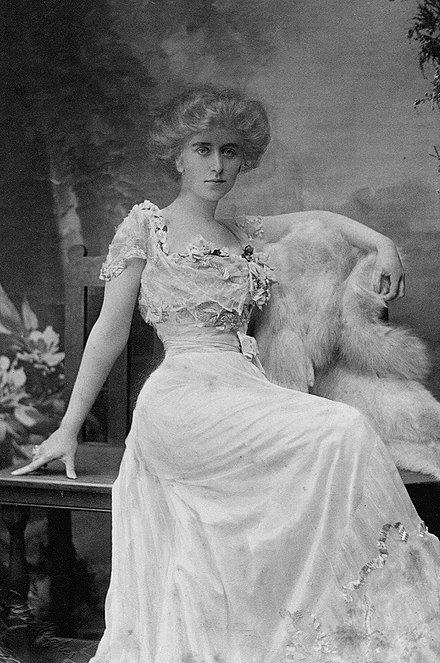Natalie Clifford-Barney
the amazon
Who was she?
Natalie Clifford Barney was an American writer who hosted a well-known literary salon at her home in Paris. She influenced other authors through her salon and also with her poetry, plays, and epigrams, often thematically tied to her lesbianism and feminism.
Barney was born into a wealthy family. Her mother was the artist Alice Pike Barney and her father owned the Cinncinati Opera House. Barney's sister Laura was a writer in her own regard, a convert to and authority on the religion Baháʼí.
She expressed a desire from a young age to live openly as a lesbian, and moved to France with her first romantic partner, Eva Palmer. Inspired by the work of Sappho, Barney began publishing love poems to women under her own name as early as 1900.
Writing in both French and English, she supported feminism and pacifism. She opposed monogamy and had many overlapping long and short-term relationships. Some of her most well known liasions were with Renée Vivien, Dolly Wilde, Romaine Brooks, Colette, and 'the red duchess' Élisabeth de Gramont.
Barney hosted a salon in Paris for more than 60 years, bringing together writers and artists from around the world. Attendees of various sexualities expressed themselves and mingled comfortably at the gatherings.
She worked to promote writing by women and hosted a "Women's Academy" (L'Académie des Femmes) in her salon as a response to the all-male French Academy. The salon closed during World War II while Barney lived in Italy with Brooks. After the she returned to Paris and resumed the salon.
Her stance on the War is a bit sticky. Despite having Jewish heritage, she believed some early Axis propaganda about the Allies as aggressors, and due to her pacificsm, did not support their effort. Some of her unpublished work at the time runs a tad facist and anti-semitic, though whether this was an attempt to distance herself from accusations of being Jewish, or influeced by her friend Ezra Pound's open facism, we will never know. She was investigated by Italian authorities during the war, and her sister Laura had to attest to her confirmation, due to their family's Jewish heritage. However, despite her uncertain ideological position, she did help to smuggle a Jewish couple out of Italy, and towards the end of the war, she changed her stance to see the Allies as liberators.
Her nickname comes from Remy de Gourmont, a longtime friend, and lasted until her death. She clearly enjoyed the identitifcation, and one of her works is even titled Thoughts of an Amazon.
Why is she here?
I included Natalie in the museum because I think she's so cool, and because the Belle Epoch is not an era traditionally associated with out and proud polyamorous lesbianism.
There's something about her relationship with Renee Vivien, when I was reading about it, that haunted me. Vivien was herself haunted, suffering from rather severe mental illness and possible anorexia. She died young, and Clifford-Barney served as a chairperson on the jury of a literary prize named in her honour. Barney described her life, around fifty years after her death, a "one long suicide. Everything turned to dust and ashes in her hands." Natalie's later relationship with Dolly Wilde (yes, that Wilde, she was his niece) seemed to mirror her attempts to save Vivien from a fate she was powerless to stop, repeatedly funding detoxifications for Dolly's various addictions. With Dolly, too, she did not succeed.
While I know that Natalie went on to have many more loves, part of me wonders if she ever really got over Vivien. They were separated before Vivien died when the latter returned to her lover Baroness van de Zuylen, who later left her. Vivien had planned to return to Paris with Barney after seeing the Baroness, but she didn't, and died before the pair met again. Certainly Natalie still cared for Renee, taking over the prize in her honour after van de Zulyen, it's founder, died.
I've been trying to find a copy of the poem she wrote while trying to win Vivien back in 1904, called Je Me Souviens, but I cannot for the life of me find it anywhere. If anyone does know where to find a copy, please get in touch with me!
What did she say?
My queerness is not a vice, is not deliberate, and harms no-one.
She [Vivien] had found new inspiration thorugh me, almost without knowing me.
[Scandal is] the best way of getting rid of nuisances.
If I had one ambition it was to make my life itself into a poem.
There are more evil ears than bad mouths.
[Was is] an involuntary and collective suicide ordained by man.
Romanticism is a childhood ailment; those who had it young are the most robust.
One is unfaithful to those one loves in order that their charm does not become mere habit.
If we keep an open mind, too much is likely to fall into it.
We know all their gods; they ignore ours. What they call our sins are our gods, and what they call their gods, we name otherwise.
Time engraves our faces with all the tears we have not shed.
The Phantom Guest
We lay in shade diaphanous
And spoke the light that burns in us
As in the glooming's net I caught her,
She shimmered like reflected water!
Romantic and emphatic moods
Are not for her whom life eludes...
Its vulgar tinsel round her fold?
She'd rather shudder with the cold,
Attend just this elusive hour,
A shadow in a shadow bower,
A moving imagery so fine,
It must have been her soul near mine
And so we blended and possessed
Each in each the phantom guest,
Inseparate, we scarcely met;
Yet other love-nights we forget!
